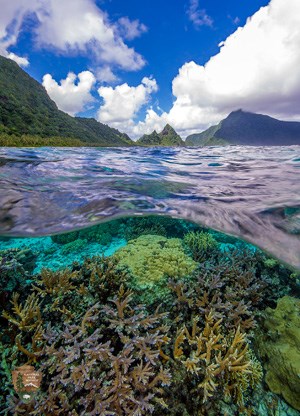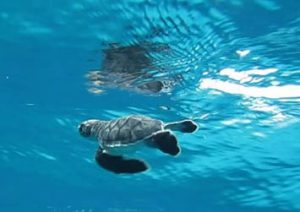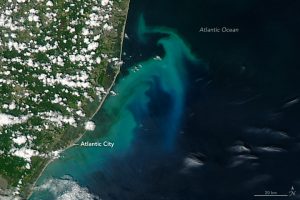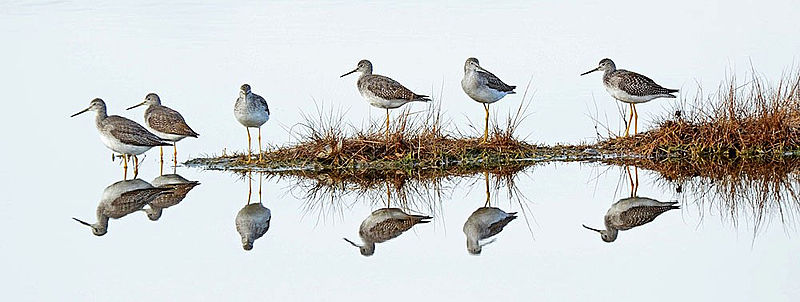Marine Life
The dazzling vibrancy of coral reefs, the fleeting streaks of color as shorebirds alight, flying up and above the waves, the sight of young sea turtles flecked with granules of sand, clambering for open ocean, the bioluminescence of extraordinary organisms churning in deep sea; When we catch glimpses of the myriad life dotting the ocean’s blue expanse, we are often struck by its beauty. But marine life is not only vibrant; it is vital. So much as the visible compels us, it is the invisible that sustains us. Marine microbes, which drive carbon sequestration in the oceans, comprise more than 98% of ocean biomass. Floating in delicate glass walls of Silica, diatoms, a type of phytoplankton, produce one fifth of the air we breathe. Collectively, phytoplankton are responsible for every other breath we take. These tiny organisms also form the basis of marine foods webs that support Earth’s largest animal, the blue whale. Larger species also support marine ecosystems. Green sea turtles, for example, foster healthy seagrass meadows and coral reefs, critical habitats for commercial fish species that billions depend upon for their livelihoods or food security. Whales act as ecosystem engineers, recycling nutrients and increasing ocean productivity. As top predators, sharks are good indicators of ocean health and keep marine food webs in balance. These are just a few examples of the roles marine species play on the greater stage of life. Federal protection of endangered species has allowed some marine life to come back from dramatic declines: 77% of marine mammals and sea turtles listed under the Endangered Species Act are recovering in population size. In 2016, humpback whales had recovered so much that most populations were taken off the endangered species list. Marine mammals not listed as endangered are still protected by the Marine Mammal Protection Act. Despite recovery of some species, many forms of life, such as shore birds, are still facing rapid decline. A confluence of climatic threats to the ocean pushes marine life to a precarious existence. The ocean is 30% more acidic than it was before industrialization. As the ocean absorbs carbon from the atmosphere, it forms carbonic acid which dissolves calcium carbonate structures of corals, mussels, clams, oysters, and starfish. The ocean is not only acidifying but also gasping for air: over the past 50 years, the volume of ocean with no oxygen has quadrupled. Oxygen is consumed by algal blooms spurred by warming temperatures and nutrient overload from sewage and agricultural run-off spilling from land into our seas. “Fish, amphibian, and reptile, warm-blooded bird and mammal — each of us carries in our veins a salty stream in which the elements sodium, potassium, and calcium are combined in almost the same proportions as in sea water.” The makeup of our atoms is not unlike that of the sea. Without ever splashing our feet into its salty waters, we all connect to the ocean in this way. Some may know the ocean personally, some may know it through photos, art, or the work of marine scientists such as Rachel Carson, whose book Under the Sea-Wind transforms an imagination of ocean life into a vivid reality. The RCC seeks to continue to bring the ocean to life, highlighting our interconnectedness with the sea and our need to protect it. Octopuses Are Highly Intelligent. Should They Be Farmed for Food? In the wild, octopods are solitary animals that roam freely in the sea. They spend their days and nights catching prey with their eight arms. Read more Climate Change and Boat Strikes Are Killing Right Whales. Stronger Speed Limits Could Save Them. Amid a difficult year for North Atlantic right whales, a proposed rule to help protect them is one step closer to reality. Read more Whales and Carbon Sequestration: Can Whales Store Carbon? The ocean captures about 31 percent of all carbon dioxide emissions, removing carbon from the atmosphere that would otherwise continue to trap heat and increase temperatures. Blue carbon, or carbon captured by ocean ecosystems includes: Carbon absorbed by aquatic plants, algae, and phytoplankton; Carbon stored in the bodies of living animals; Carbon sequestered in deep-sea sediments. Read more An Amazing 200 Million Year-Old Race First Marine Fish Declared Extinct Due to Human Activity Click here for Past Issues of the RCC Coasts and Ocean Observer Click here for Previous Marine Life News
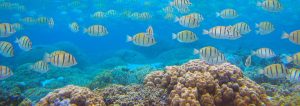 We come from life in the ocean — the chemistry of our bodies is testament to that past. As Rachel Carson wrote in The Sea Around Us,
We come from life in the ocean — the chemistry of our bodies is testament to that past. As Rachel Carson wrote in The Sea Around Us, Latest News About
Marine Life
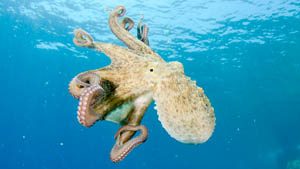 A Spanish company is aiming to factory farm octopuses for their meat, contending that it would help conserve the creatures in the wild. But critics argue that caging these highly sensitive mollusks, whose intelligence science is still revealing, would be cruel and inhumane.
A Spanish company is aiming to factory farm octopuses for their meat, contending that it would help conserve the creatures in the wild. But critics argue that caging these highly sensitive mollusks, whose intelligence science is still revealing, would be cruel and inhumane.
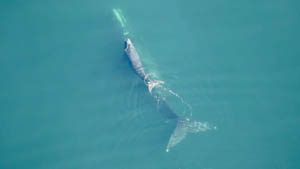 Nearly a century after we almost hunted them to extinction, fewer than 360 right whales remain.
Nearly a century after we almost hunted them to extinction, fewer than 360 right whales remain.
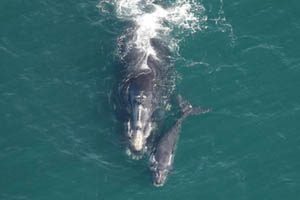 Whales can help mitigate climate change impacts by storing carbon in their bodies and transporting nutrients that benefit ocean food chains.
Whales can help mitigate climate change impacts by storing carbon in their bodies and transporting nutrients that benefit ocean food chains.
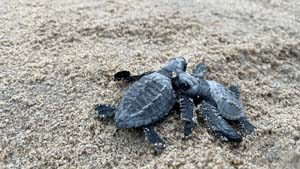 I SIT ON A LOG on a San Pancho beach of western Mexico’s Nayarit coast, watching. Soon, we’ve been told, there will be a release of sea turtles, but we don’t know quite where, so we observe the movement of humans on the beach—couples in beach chairs; groups of young, tattooed surfers smoking cigarettes and weed; a woman reading a book. An older man races by in a dune buggy with a woman beside him, and then returns a moment later without her, rousing a trio of short-legged mutts to chase after him, barking and chomping at the tires.
I SIT ON A LOG on a San Pancho beach of western Mexico’s Nayarit coast, watching. Soon, we’ve been told, there will be a release of sea turtles, but we don’t know quite where, so we observe the movement of humans on the beach—couples in beach chairs; groups of young, tattooed surfers smoking cigarettes and weed; a woman reading a book. An older man races by in a dune buggy with a woman beside him, and then returns a moment later without her, rousing a trio of short-legged mutts to chase after him, barking and chomping at the tires.
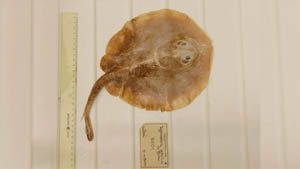 A species of ray, so rare it has only ever been recorded once back in the late 1800s, has been declared extinct after an assessment by an international team led by Charles Darwin University (CDU). Read more
A species of ray, so rare it has only ever been recorded once back in the late 1800s, has been declared extinct after an assessment by an international team led by Charles Darwin University (CDU). Read more
![]() Sign Up Here to Receive the Monthly RCC Coasts and Ocean Observer and Other RCC newsletters, Information and Alerts.
Sign Up Here to Receive the Monthly RCC Coasts and Ocean Observer and Other RCC newsletters, Information and Alerts.






